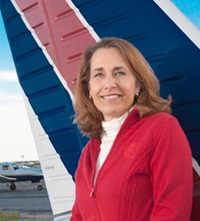

Kathy Yodice
- Attorney, Counsel to AOPA
- Former FAA attorney
- Has assisted AOPA members for more than 16 years
- Pilot since 1994, owns a Cherokee 180
Last year, Congress passed the Pilot’s Bill of Rights unanimously only a year after being introduced, and the president signed the bill into law, effective immediately, thus changing some of the legal landscape for us. There is a great deal of substance to that legislation. All of the substance was intended to right a system that was way out of whack in favor of the FAA, and against those of us in the industry. We had been squawking about the unfairness for years, even decades, but the FAA wouldn’t hear any of it. Why should they? They were making all the rules, and no one was slapping their hand to signify to them that some of those rules or the application of those rules was not right. The NTSB showed little interest in challenging the FAA when a case was brought before them, and the NTSB was often criticized as rubber stamping the FAA. When the NTSB seemed to finally be coming around to recognizing the extent to which the FAA was permitted to steam roll pilots and others in the industry, they were almost stopped in their tracks by a statutory requirement that required the NTSB to follow FAA’s interpretations and sanction choices. The NTSB was stuck.
So, the changes brought about by the Pilot’s Bill of Rights were long overdue. As a result of the new legislation, the NTSB is not bound by the FAA’s position in a case any longer, though the NTSB must accord some deference to the FAA’s interpretation of its regulations just as any court must do when hearing from an expert agency. The FAA is being strictly held to a standard of proving any FAR violations that would apply in our state and federal courts, and we are held to the same standard. The NTSB is critically reviewing the FAA’s charges and our arguments in defense of those charges in deciding whether a violation has been proved and, if so, the proper sanction. FAA is required to specifically notify us if we’re under investigation for our flight activities. We are able to access air traffic records of our communications and flight paths that had previously been denied simply because the FAA was investigating a particular flight, so we can use that air traffic data to help us respond to the FAA’s investigation. We are waiting on some notam changes to help guard against an unintentional intrusion into a TFR that pops up or was so buried in a pre-flight briefing as to elude us. We are looking forward to an appropriate medical certification program that elicits information from us but doesn’t set us up for making mistakes on an antiquated medical application form. These are fixes to the system that give back rights to airmen and justice to the system, while still supporting the ultimate goal shared by all of us: safety in flying. More work needs to be done, but the Pilot’s Bill of Rights gave us a great boost back to the middle.
Also done in 2012, AOPA and EAA submitted a petition for exemption from the FAA’s rules to allow a limited group of aviators to operate aircraft without being required to hold an FAA-issued medical certificate. Legally, we are obligated to follow the requirements in the FAA’s regulations, but the law allows the FAA to grant exemptions to those requirements if it is in the public interest. The FAA’s exercise of this authority is in the nature of agency rulemaking, hence the reason for the formality with a carefully prepared and supported petition and a decision from the FAA that could trigger additional legal proceedings. We have advocated for years that the requirement for a third-class medical certificate may be unnecessary and that the FAA should engage in rulemaking to eliminate or restrict the need for that class of certification. The FAA favorably responded in some measure by extending the duration of a third-class medical certificate for pilots under 40 years of age and by giving us the sport pilot rule. Otherwise, the FAA has steadfastly refused to consider such a proposition, in part because the FAA believes that there is not any data to support the removal of this requirement.
AOPA and EAA disagree with the FAA. But, those associations had little recourse. So, in order to get the issue squarely before the agency in a process that requires a final agency action, the associations submitted the petition for exemption. It’s not a request for rulemaking, but rather, a request that some individuals who qualify be exempted from the requirement to hold a third-class medical certificate. The exemption seeks legal relief for only a segment of our pilot population under certain operational circumstances, provided the airman has completed a medical education program and is able to consciously assess his or her medical fitness to fly. The petition states that the requested relief would provide an equivalent level of safety to that currently provided in the regulations, maybe even a higher level of safety because of the ongoing educational component, and it is based in part on established experience with other operations not requiring a medical certificate. The law does not impose a deadline on the FAA to decide whether to grant or deny the petition, but the law will not allow them to avoid making that decision either.
This year, we came to find out how far the agents of Customs and Border Protection were intruding into our domestic flying activities. We learned of numerous instances of federal and local law enforcement officers stopping domestically flown general aviation aircraft for no apparent reason. There did not seem to be any pattern to the stops, other than being general aviation aircraft operating into general aviation airports. The officers would ask the pilot to present pilot and aircraft certificates, and the officers would ask to search the aircraft. Sometimes, the officers had drug-sniffing dogs that reportedly got a “hit” on the aircraft to then warrant a search of the aircraft. The descriptions of some of the stops and searches were alarming. And, most of the time, there was no apparent or stated reason for the stops. In a few instances, the pilot was told that illegal drugs were suspected, but drugs were never found and it was never explained why drugs were suspected to justify the stop. We can certainly understand the concern expressed by these pilots. First, it can be confusing and disturbing to be approached by armed agents demanding information. Second, it can be costly if the drug-sniffing dogs scratch your paint and if the search renders your aircraft unairworthy.
What is CBP’s authority to do this? Isn’t their authority limited to the borders? And, why are they stopping us? Is it random or is there some inexplicable profile that makes stopping at a small airport for cheaper fuel suspicious? So, we got right to work to be able to explain the breadth of the government’s authority so that we could be comforted that what was happening was necessary. We researched the statutes, the regulations, the executive orders, and any other resources. We burrowed, we pondered, we rooted, we analyzed. Nothing. There wasn’t any authority to be found that permitted the stops and the searches that we were hearing about. We made requests under the Freedom of Information Act (FOIA) to ferret out what records about us existed in these government agencies and what CBP thought we were up to in stopping us. No response. We asked CBP to cite their authority to engage in this conduct. Still, no response. Then, we invoked the threat of legal process and Congress got involved. CBP answered one of our FOIA requests saying that no records existed, or if they did exist, the record would be exempt from disclosure to either the individual or the public. CBP then stood behind their conduct saying that they had authority to stop an aircraft based on FAA’s statute and regulations. This makes no sense; the FAA’s regulations and statute impose a presentation requirement on pilots but does not confer authority on CBP to stop an aircraft without independent agency authority to be stopping, asking, and searching in the first place. We will continue to press this issue.
So, the legal issues are in fact big, and they matter a great deal to our ability to fly, at least in my opinion. My colleagues in law and I will continue to advocate to make sure the laws, and the application of the laws, are appropriate to a balance of safety, fairness, and liberty, just to name a few.
Kathy Yodice is an aviation attorney for AOPA’s Pilot Protection Services and Legal Services Plan. She’s assisted AOPA members for more than 13 years and is a former FAA attorney. Kathy owns a Cherokee 180 and has been a pilot since 1994.
To continue reading, please log in or join AOPA now to have access to these exclusive expert resources.
Judging from the work our office has been doing lately to help preserve our freedom to fly, it certainly seems to me that there are new and bigger legal issues warranting our attention. I’m not trying to make a case for the value, or not, of lawyers and I’m not trying to advocate for more work. I’m just saying.



